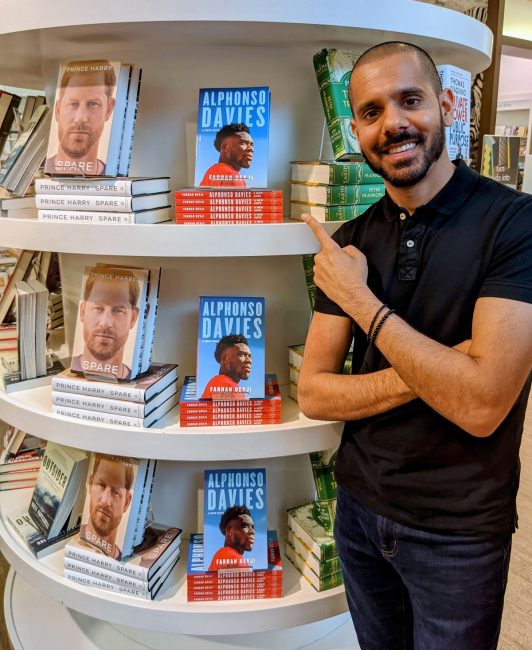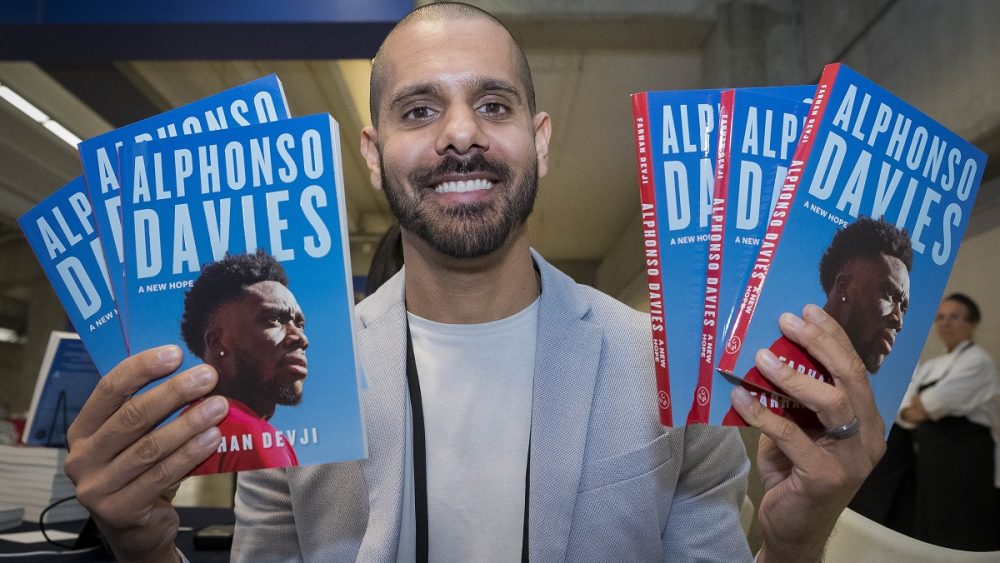“Davies represents the very best of what Canada has to offer”
Born and raised in British Columbia, Devji’s parents immigrated to the west coast in Canada in the 1970s during a time of political unrest in East Africa. Their gratitude to Canada for opening its doors to them also shaped Devji as a person – and he immediately felt a connection to Davies when he first heard his story: Davies, who was born in a refugee camp in Ghana before coming to Canada with his family. In this interview, Devji looks back on the first time he ever saw Davies play and talks about the role of the young player as a beacon of hope for an entire nation.
You used to work as a club reporter of the Vancouver Whitecaps. What made you interested in writing about football in the first place?
Two of my biggest passions are sports and writing, so working for the Whitecaps as their club reporter felt like a natural career choice. I actually did two separate internships with the Whitecaps while I was completing my journalism degree before joining the club full-time in 2013. Although hockey is the big sport here in Canada, football was the first sport I ever played in an actual league, because it was the most affordable. But I wasn’t very good! So now I mostly stick to writing about it.
Do you still remember the first time you saw Davies play?
I’ll never forget it. It was on my birthday, February 3, 2016. We were in Tucson, Arizona for the Whitecaps’ first-team training camp, and Davies had been invited to participate even though he’d just turned 15 years old and was still a member of the academy. I thought they were only bringing him there for the experience, but he was subbed into the first preseason game against the Seattle Sounders around the 60th minute. Just a few minutes later, he took an elbow to the face that left him with a bloody mouth. I thought, “OK, maybe playing a 15-year-old against a bunch of middle-aged men wasn’t the best idea.” But he quickly got patched up on the sideline and finished the game.
That in itself was impressive. Then right away you saw some glimpses of what he was capable of. He would take players on one-v-one, or in some cases one-v-two or three, at top speed. He would go into duels with players much bigger than him. He had no fear.
When did you realize that Davies had something special?
In those first couple years, you definitely saw the potential. Everyone could see it. But it was just potential at that point. The end product wasn’t there. It wasn’t until 2018, his final season in Vancouver, when everything came together. That year, he took MLS (Major League Soccer) by storm. He was still only 17 years old, but it felt like he was the best player on the pitch every game. Other coaches were talking about how they actually had to create gameplans to try and contain him. And not many of them were successful. There was a game against Orlando when he had one goal and three assists, and then a game against Minnesota where he had two absolutely world-class goals and two assists, just a few days after the transfer to FC Bayern had been announced. By then, it was obvious this kid was too good for MLS. He was going to be special.
Could you tell me a little bit more about the idea of writing a whole book about Davies and how that process looked like?
Back in 2017, I travelled to Davies’ hometown of Edmonton, Alberta to help produce a mini documentary about his family’s journey to Canada. I got to sit down with his parents and learn about the struggles they faced in Liberia during the civil war and raising Davies on a refugee camp in Ghana. That kind of planted a seed in mind about maybe writing a book about this one day. When he was transferred to Bayern the following year, I started to consider it more seriously. But it wasn’t until 2020 that I really started to pursue it. That, of course, was during Davies’ breakout season at Bayern, where he helped them win the sextuple. So I ended up getting a publisher on board and quitting my job at the Whitecaps to really focus on this. I did more than 50 interviews for the book, speaking to people from every stage of his life and career, including Bayern technical director Marco Neppe and two of Davies’ first friends at the club, Joshua Zirkzee and Chris Richards. It was an extensive process.

Of all the stories you have heard about him, which one is your favorite?
Oh, that’s tough. It’s hard to pick just one! I really enjoyed hearing some of the stories around his transfer to Bayern, such as when he was in the car heading to a meeting with Marco Neppe and Hasan Salihamidžić when a call from PSG came in. Michael Reschke also shared some great insights about Stuttgart’s pursuit of Davies, and how they travelled to Vancouver to open discussions not knowing that Bayern was already there closing the deal. Then there were the stories from the Manchester United scout, who went above his boss and wrote directly to Jose Mourinho recommending the club sign him immediately. That same scout also met with Davies when he was 15, and Davies told him that his goal was to buy a car and a home for his parents. And he ended up doing both of those things.
Where do you see Davies in the long run? Do you think he’ll stay at FC Bayern?
That’s the million-dollar question. Or, perhaps, the 70-million-dollar question! When I spoke to Marco Neppe last year, he told me he sees Davies as being one of the future faces of the club. With the rumors of Benjamin Pavard and Lucas Hernandez potentially leaving, and Joao Cancelo’s loan expiring, I would think that Bayern will do everything they can to keep Davies in Munich. But he’s definitely going to have options. I do know that Pep Guardiola thinks highly of him. That’s what Michael Reschke told me based on his conversations with Pep. And I also know that Carlo Ancelotti would have been following his career for a while, considering he sees Canada as his second home and has spent a lot of time in Vancouver through the years. So we’ll just have to wait and see what happens!
Could you explain (specifically to those of us who are not Canadian) what Davies means to the country, in terms of football, but also perhaps – as you so aptly said in the book title – as a new hope, not only as an athlete, but also as a person?
On the football side, the Canadian men’s national team had been irrelevant for so many years. People saw them as a laughingstock. There was a lot of heartache. A lot of dark days. For a long time, it felt like they had no hope. Davies played a big part in changing that narrative. Previously, many of the top Canadian men’s players, like Owen Hargreaves and Jonathan de Guzman, opted not to even play for Canada. Davies, on the other hand, has been carrying the Canadian flag with pride. He’s changed the way people view Canadian men’s soccer, within the country itself and around the world. As a person, he just represents the very best of what Canada has to offer. People here are very proud of our multiculturalism and our acceptance of immigrants and refugees. He’s a shining light for what’s possible, and a beacon of hope for refugees everywhere.
How far do you think Canada will go during the next World Cup, and what role will Davies play?
Now that Canada had a taste of the World Cup, the expectations will definitely be higher in 2026. The minimum expectation will be to win a game, because they’ve never done that. But with the expanded format, and with Canada co-hosting, they should also be expected to get out of the group. Anything less than that would be a disappointment. If Canada’s top players keep progressing at the rate they have been – players like Davies, Jonathan David, Tajon Buchanan, Stephen Eustáquio, Alistair Johnston, and Ismaël Koné, who are all playing at a high level in Europe – I could see them advancing to the Round of 16 or the quarterfinals. And Davies will be front and centre, like he always is for Canada.












[…] Source […]